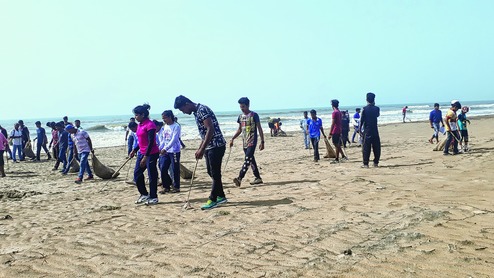
Berhampur: The Rushikulya rookery in Ganjam district, famous for mass nesting of the endangered olive ridley turtles, will have another nesting site along the adjoining 3km stretch from Sunapur to Anantaraipur near the Bahuda river mouth.
"Olive ridley turtles now prefer the Ganjam coast. Mass nesting has increased in the past two years and crossed the all-time record this year with 4.82 lakh," said Berhampur divisional forest officer Asish Kumar Behera.
"If we prepare the beach near the Bahuda river mouth, it may attract more turtles next year," he said.
The Berhampur Forest Division and members of the Anchalik Vikash Parishad, Boxing Odisha and a local organisation - Swachh Bharat Team - undertook a beach cleaning drive on Saturday.
"Picnickers make the beach dirty and we tried to clean the beach as an initial attempt to make it favourable for mass nesting. We received reports of sporadic turtle nesting at the beach recently," said Berhampur forest ranger Raja Rao Subudhi.
Eco Club coordinator Shankar Narayan Bej said: "We launched the programme as we celebrate World Sea Turtle Day today to create awareness about ecological systems and sea turtle conservation."
Sunapur panchayat samiti member Debahari Behera said thousands of olive ridley turtles came to the beach, spread from Sunapur to Anantaraipur, for mass nesting about 15 years ago.
"Now the number has considerably decreased. Fishermen from Patisunapur, Rameyapatna, and Markandi in Odisha and Dankuru in Andhra Pradesh use gill nets in their mechanised boats, even during the congregation of turtles. They don't use Turtle Excluder Devices (TED). The first step to invite this species would be the enforcement of the existing ban on near-shore mechanised fishing. TED should be made mandatory for all trawlers in offshore coasts," he said.










